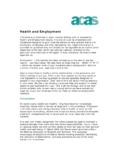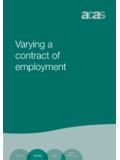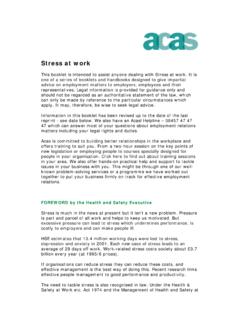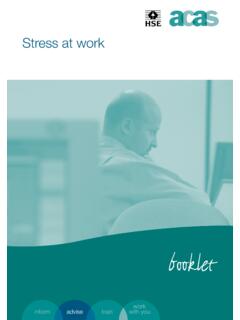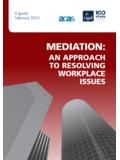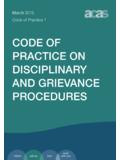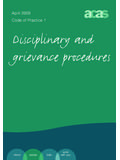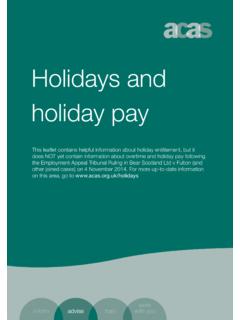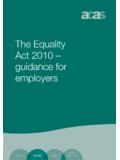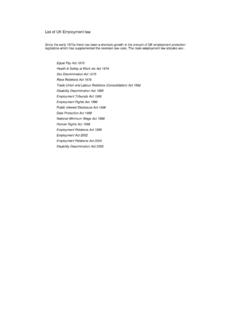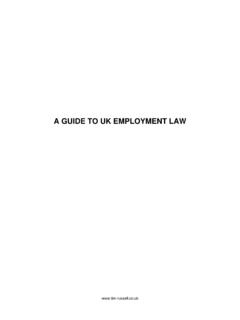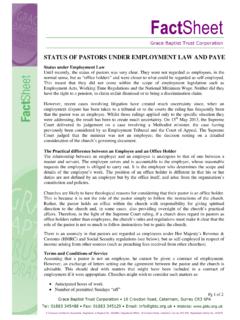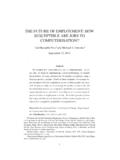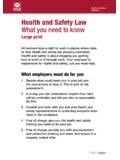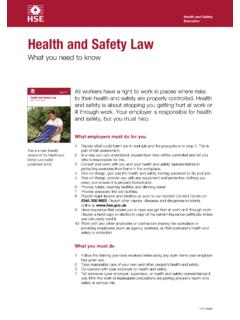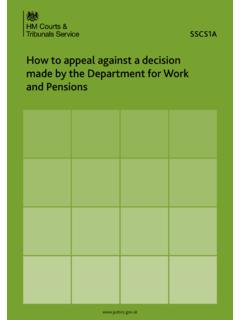Transcription of Discipline and grievances at work - Acas
1 Discipline and grievances at workThe Acas guideEvery year Acas helps employers and employees from thousands of workplaces. That means we keep right up-to-date with today s employment re lations issues such as Discipline and grievance handling, pre venting discrimination and communicating effectively in workplaces. Make the most of our practical experience for your organisation find out what we can do for informWe answer your questions, give you the facts you need and talk through your options. You can then make informed decisions. Contact us to keep on top of what employment rights legislation means in practice before it gets on top of you. Call our helpline 0300 123 1100 for free confidential advice (open 8am-6pm, Monday to Friday) or visit our website advise and guideWe give you practical know-how on setting up and keeping good relations in your organisation.
2 Download one of our helpful publications from our website or call our Customer Services Team on 0300 123 1150 and ask to be put you in touch with your local Acas trainFrom a two-hour session on the key points of new legislation or employing people to courses specially designed for people in your organisation, we offer training to suit you. Go to to find out work with youWe off er hands-on practical help and support to tackle issues in your business with you. This might be through one of our well-known problem-solving services. Or a programme we have worked out together to put your business firmly on track for effective employment relations. You will meet your Acas adviser and discuss exactly what is needed before giving any go-ahead. Go to for more not keep up-to-date with Acas news and notifications by signing up for our popular e-newsletter.
3 Visit inform, advise, train and work with you 1 ContentsIntroduction 3 Handling Discipline an overview 5 Handling grievances an overview 6 Using mediation 7 Discipline 9 Keys to handling disciplinary problems in the workplace 10 Resolve Discipline issues informally 10 Develop rules and procedures 11 Keeping written records 15 Dealing fairly with formal disciplinary action 16 Establishing the facts 17 Informing the employee 18 Holding a disciplinary meeting 19 Allowing the employee to be accompanied 23
4 Taking action after the disciplinary meeting 26 Provide employees with an opportunity to appeal 34 Dealing with special cases 36 grievances 39 Keys to handling grievances in the workplace 40 Resolve grievances informally 40 Develop rules and procedures 40 What is a grievance and why have a procedure? 40 Keeping written records 42 Dealing with formal grievances 43 Let the employer know the nature of the grievance 44 Holding a grievance meeting 44 Allow the employee to be accompanied at the grievance meeting 47 Decide on appropriate action 50 Allow the employee to take the grievance further if not resolved 51 Appendix 1 54 Disciplinary rules for small organisations 54 Appendix 2 55 Sample disciplinary and grievance procedures 55 Sample grievance procedure (small organisation)
5 59 Discipline AND grievances AT work THE ACAS GUIDE2 Appendix 3 60 Sample letters 60 Appendix 4 71 Dealing with absence 71 Appendix 5 77 Basic principles of the Data Protection Act 1998 and Equality Act 2010 77 Appendix 6 80 Important changes to making employment Tribunal claims 80 Glossary 82 Acas Training 84 Acas Publications 85 Notes 86 678910 INTRODUCTION3 IntroductionThis guide provides good practice advice for dealing with Discipline and grievances in the workplace. It complements the Acas Code of Practice on disciplinary and grievance procedures. Extracts from the Code of Practice are reproduced in shaded boxes accompanied by further practical advice and guidance.
6 Extract: Acas Code of Practice on disciplinary and grievance procedures This Code is designed to help employers, employees and their representatives deal with disciplinary and grievance situations in the workplace. The Acas Code of Practice sets out principles for handling disciplinary and grievance situations in the workplace. This guide provides more detailed advice and guidance that employers and employees will often find helpful both in general terms and in individual cases. employment tribunals are legally required to take the Acas Code of Practice into account when considering relevant cases. Tribunals will also be able to adjust any compensatory awards made in these cases by up to 25 per cent for unreasonable failure to comply with any provision of the Code. This means that if the tribunal feels that an employer has unreasonably failed to follow the guidance set out in the Code they can increase any award they have made by up to 25 per cent.
7 Conversely, if they feel an employee has unreasonably failed to follow the guidance set out in the Code they can reduce any award they have made by up to 25 per cent. employment tribunals are not required to have regard to guidance in this booklet that does not form part of the Code. If you are (or expect to be) affected by such an issue, see Appendix 6 on important changes to making a tribunal law on unfair dismissal requires employers to act reasonably when dealing with disciplinary issues. What is classed as reasonable behaviour will depend on the circumstances of each case, and is ultimately a matter for employment tribunals to decide. However, the core principles are set out in the Acas Code of Practice. The foreword to the Code and this guide emphasise that employers and employees should always seek to resolve disciplinary and grievance issues in the workplace.
8 If Discipline and grievance issues are settled at 14an early stage they are normally less time-consuming and less likely to damage working relationships. Good employment relations practices including for recruitment, inductiontraining, communications andconsultation can prevent manydiscipline and grievance problemsarising. Organisations are also morelikely to have positive employmentrelationships if they make efforts togain their employees commitmentthrough: showing them clear leadershipand letting them know how theycan contribute engaging them in their work andgiving them the power to makesome decisions themselves ratherthan trying to control and restrictthem showing them respect andappreciation giving them ways to voice theirviews and provides comprehensive guidance on employment issues which you can download from our website, and information about suitable training.
9 For further details see the Acas website or call the Acas Helpline 0300 123 1100 (Open Monday Friday 8am 6pm). Discipline AND grievances AT work THE ACAS GUIDEINTRODUCTION51 Always follow the Acas Code of Practice on disciplinary andgrievance proceduresIt may be helpful to consider mediationat any stage see p7 Take informalactionwhereverpossible (see p10)Issue resolved ActioncompleteNOTE: checkyour policiesand proceduresare up-to-date(see p55)Take formal actionestablish factsnotify employeein writinghold meetingallow the employee to be accompanieddecide action(see p16)Inform employee ofresultno penaltyfirst written warning/improvement notefinal written warningdismissal or other sanction(see p26)Conduct orperformancefails toimprovesufficiently =take furtheractionProvide employees withan opportunity to appeal(see p34)Conduct orperformanceimprove =actioncompleteEmployeedismissed Handling Discipline an overview6 Handling grievances an overviewAlways follow the Acas Code of Practice ondisciplinary andgrievance proceduresResolvegrievancesinformally often a quietword is all thatis neededIt may be helpful to consider mediation at any stage of a dispute.
10 For more information (see p7)Train managers and employee representatives to handle grievances effectivelyUse yourgrievanceprocedure whenit is not possibleor appropriate toresolve the matterinformallyEmployee to let the employer know the grievance in writingMeeting to discuss the grievanceAllow the employee to be accompanied atthe meetingDecide on appropriateactionAllow the employee toappeal if not satisfied(see p45-51)Deal with appealimpartially and wherepossible by a managernot previously involved INTRODUCTION71 Using mediation An independent third party or mediator can sometimes help resolve disciplinary or grievance issues. Mediation is a voluntary process where the mediator helps two or more people in dispute to attempt to reach an agreement. Any agreement comes from those in dispute, not from the mediator. The mediator is not there to judge, to say one person is right and the other wrong, or to tell those involved in the mediation what they should do.
